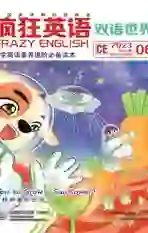一般将来时态与“be going to”结构的异同
2023-11-09林欣欣
林欣欣
动词一般将来时态表示句子的主语在将来某一时刻发生的动作或存在的状态,或将来某段时间内经常发生的动作或持续存在的状态。小学英语中最常用的表示将来发生的动作或存在的状态的语言结构形式有两种,即动词的一般将来时态和“be going to”结构。
一、动词的一般将来时态
1. 基本结构
主语 + will/shall + 动词原形。通常情况下,只有主语是第一人称(I 或we)时,才用shall,而will 则适用于任何人称和数。
需要注意的是,一般将来时态中的will 或shall 都是助动词。
2. 基本功能
表示句子的主语将要发生的动作或将会呈现的状态。如:
I will come back soon.
我很快就回来。 (表示主语将要发生的动作)
It will be sunny tomorrow.
明天将是晴天。(表示主语将会呈现的状态)
3. 基本句式
(1)一般疑问句
一般将来时态的一般疑问句句式结构是“Will 或Shall + 主语 + 动词原形 + 其他 + ?”, 其肯定回答是“Yes, 主语 + will 或shall”,否定回答是“No, 主语 + wont 或shant”。如:
A: Shall we go to visit the Summer Palace this weekend?
B: Yes, we shall.
甲:这个周末我们将去参观颐和园吗?
乙:是的。
A: Will the Australian friends come to visit our school next week?
B: No, they wont.
甲:澳大利亚的朋友们将在下周参观我们学校吗?
乙:不,他们不来。
A: Will it be very hot this summer?
B: Yes, it will.
甲:今年的夏季将会很热吗?
乙:是的。
(2)否定句
一般将来时态的否定句句式结构是“主语 + will 或shall not +动词原形 + 其他”。如:
Charlie will not come to school today, for he is ill in bed.
查理今天将不来上学,因为他生病卧床。
There wont be a concert here tomorrow.
明天这里没有音乐会。
I wont go to watch the movie, as Ill have to finish my homework tonight.
今晚我將不去看电影,因为我要完成我的家庭作业。
(3)特殊疑问句
一般将来时态的特殊疑问句句式结构是“疑问词 + will/shall +主语 + 动词原形 + 其他 +? ”。如:
Who will be our team leader?(针对主语提问)
谁将是我们队的领队?
What will he do this evening?(针对宾语提问)
今晚他将干什么?
When will you visit him?(针对时间状语提问)
你将什么时候去拜访他?
Where will they have a running race?(针对地点状语提问)
他们将在哪里赛跑?
Whose birthday party will be held next Tuesday?(针对定语提问)
谁的生日派对将在下周二举办?
Which team will win the game?(针对定语提问)
这场比赛哪个队将会赢?
A: How will they go to Hangzhou?(针对方式状语提问)
B: By plane.
A: Why wont they go there by train?(针对原因状语提问)
B: Because the distance between Zhuhai and Hangzhou is too long.
甲:他们将如何去杭州?
乙:坐飞机。
甲:为什么他们不坐火车去呢?
乙:因为珠海和杭州之间的距离太远了。
需要注意的是,有些句子中虽然也含有shall 或will,但是这些句子并不是动词的一般将来时态,因为shall 和will 还可以用作情态动词,表示人的情感(决心、意志等)。如:
Will you please open the window?(表示向对方提出请求)
请你把窗户打开好吗?
Shall we go to see a film now?(表示征求对方的意见)
我们现在去看电影好吗?
二、“be going to”结构
“be going to”结构表示主观的打算或计划,一般指对近期要做的事的安排或最近有迹象表明会发生的事情。如:
I am going to meet him at the school gate.
我打算和他在校门口见面。
Look! Its going to rain.
瞧!天快要下雨了。
I am going to visit my teacher this afternoon.
我打算今天下午去看望我的老师。
Is he going to see a doctor?
他准备去看医生吗?
What are you going to do next?
下一步你打算怎么做?
When are you going to call him?
你打算什么时候打电话给他?
Where are you going to swim?
你想去哪里游泳?
三、兩者的区别
一般将来时态表达的意思,无论是肯定的还是否定的,都是确定的。但是,“be going to”结构表示的仅仅是主观上的打算或计划,至于这种主观上的打算或计划是否将发生,不能确定。试比较 :
She will attend the meeting.
她将参加会议。
She is going to attend the meeting.
她打算参加会议。
第一句话的意思是“她肯定参加会议”,而第二句话的意思是“她是有参加会议的打算,但她最终参加会议与否,尚不得而知”。由此可见,“be going to”结构在语义表达上具有不确定性。
Choose the correct option, A, B, C or D.
( ) 1. There ________ a meeting tomorrow afternoon.
A. will be going to B. will going to be
C. is going to be D. will go to be
( ) 2. Charlie ________ here next month.
A. isnt working B. doesnt working
C. isnt going to working D. wont work
( ) 3. He ________ very busy this week. He ________ free next week.
A. will be; is B. is; is
C. will be; will be D. is; will be
( ) 4. There ________ a dolphin show in the zoo tomorrow evening.
A. was B. is going to have
C. will have D. is going to be
( ) 5. YoYo: ________ you ________ free tomorrow?
Ann: No. I________ free the day after tomorrow.
A. Are; going to; will B. Are; going to be; will
C. Are; going to; will be D. Are; going to be; will be
( ) 6. Mother________ me a nice present on my next birthday.
A. will gives B. will give
C. gives D. give
( ) 7. Andy: Shall I buy a cup of tea for you?
Brown:________. (不,不要。)
A. No, you wont B. No, you arent
C. No, please dont D. No, please
( ) 8. Lucy: Where is the morning paper?
Jack: I ________ it for you at once.
A. get B. am getting
C. to get D. will get
( ) 9. ________ a concert next Saturday?
A. There will be B. Will there be
C. There can be D. There are
( ) 10. If they come, we________ a meeting.
A. have B. will have
C. had D. would have
( 参考答案见本期第78页)
